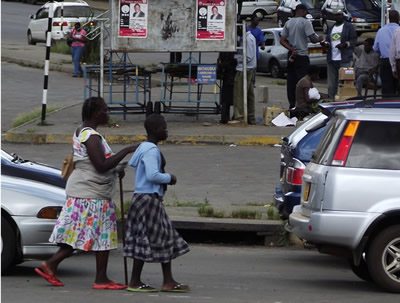Zimbabwe through a lens
Having spent a couple of days looking at Zimbabwe through a camera lens I’ve noticed that there are more people living in poverty than I originally thought, or perhaps it’s that I’ve been forced to take more notice. It’s easy to be distracted while a woman, or a child, weaves through waiting cars begging for some change, or to walk hurriedly past as an old grime-covered woman sits at a street corner rattling a metal bowl with coins. I’ve seen it so often it doesn’t even register anymore.
When I look through the lens, I am not distracted; I see them and feel the guilt of privilege and not knowing the appropriate action to take. I want to help, I just don’t know how. Should I write a strongly worded letter to my MP, whose name or address I don’t know? Should I take it up with Harare City Council and demand that they remove the homeless and beggars from the streets? Where would they go? After Operation Murambatsvina where the people became the ‘tsvina’, is that a humane plan of action?
I’ve had wild fantasies about opening a soup kitchen or a shelter. It would be a modest sort of dormitory large enough to sleep every homeless person I’ve seen, and more that I haven’t. It would be a safe, warm place with food to fill every hungry stomach. It would be so many things to so many people. .. my fantasies have remained just that.
They tell you not to give homeless people money, they don’t tell you what the alternative is. Young and seemingly unoccupied men have asked to be paid for their picture. They need money to buy ZED to dull their existence. I suppose they have a right to demand money, don’t celebrities demand payment for their pictures too? And in a way it does seem as though I’m taking advantage of their situations, their poverty to add to my portfolio of pictures. And again, I am wracked with guilt, how can I accuse others of profiting from suffering when I am doing the very same thing? I am paid to do what I do.
Often when I am allowed to take the photo I see the pain in someone who is barely holding on, and trying to make it through just one more day. But I also see quiet resolve, that resilience that Zimbabweans are so famous for. And I feel shame for all the times I was undignified in moments of what is comparatively mild discomfort.



Tuesday, April 12th 2011 at 7:15 am
Nice piece hey. being a photographer of sorts myself I can identify with how everyday stuff is different through a lens.
I remember my grade 3 teacher actually saying something along the lines of “haikona kupa vanopemha mari, you’re not helping the situation at all”. And yeah, they never offered an alternative. We’re even so quick to judge and accuse them of not living responsibly. stuff like “ahh, uri kupa vanhu ava mari, they’l just have more kids. vanovaitirei vana vacho kana vasina mari?”
We even question behaviour dzavo as if, because they are poor, they should have highers standards of behaviour. Kuita kunge havasi vanhu like you and me. if they get drunk they’re being reckless. if we do, we’re just taking some well deserved escape. such hypocrites sometimes.
Thanks again for this piece. The soup kitchen is a great idea by the way. Taking the first step (however small) setting up one would be even greater. And this might well be it…
the best
Thursday, April 14th 2011 at 3:10 pm
Thank you for reading it. As for the soup kitchen…any day now..